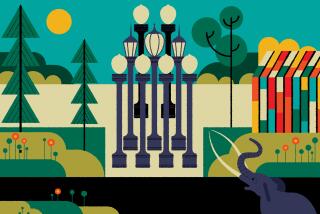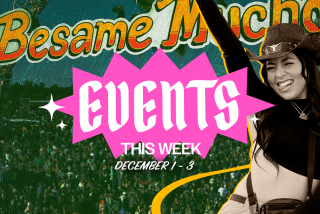Weekend Festival Offers a Mass of Masks
- Share via
Hancock County Park, where saber-toothed cats, dire wolves and other prehistoric animals perished thousands of years ago in its bubbling tar pits, will be the scene this afternoon and Sunday of an event that had its origins in antiquity. The 10th annual Festival of Masks opens at noon, produced by the Craft & Folk Art Museum located across the street from the park at 5814 Wilshire Blvd.
Artists and vendors will be demonstrating mask-making techniques and selling fine masks ranging in price from $1 to $1,000, food booths will offer international dishes, and groups from Nigeria, Bulgaria, Ethiopia, Peru, Indonesia, Italy, Greece, Mexico and Japan will perform on two stages set up in the park. Highlight of the two-day festival will be a parade of masks, beginning at 11:30 a.m. Sunday.
About 2,000 marchers are expected to participate in a cavalcade that will proceed down Wilshire Boulevard from Crescent Heights Boulevard to Curson Avenue and into the festival grounds at Hancock Park. The parade will feature 50 marching units, school groups, ethnic musicians and performers and colorful floats. Admission to the festival is free and the parade is open to any group or individual who wishes to join. Paraders must wear masks, according to sponsors, preferably innovative and handmade, to represent cultural and ethnic traditions or simply individual expression.
Masks in History
Masks have been worn from earliest recorded civilization to impersonate supernatural beings or animals in religious and magical ceremonies. They hold a special place in drama, particularly in Japan and China. In Greek plays, an actor would wear a mask designed to portray a character’s fixed emotion such as sadness or rage.
Throughout the ages, masks have been used as concrete visualizations of positive and negative forces. It was felt that demons could be driven away, rendered harmless or wooed once they were made visible and subjected to prescribed rites.
In Los Angeles, the Festival of Masks was created by the Craft and Folk Art Museum to celebrate the diverse ethnic heritage of the city and to provide an arena for cross-cultural exchange. This weekend, according to festival organizers, the mask will become the medium for revealing little-known cultural expressions, for studying native traditions and for expressing artistry and personal vision in theatre, dance and music.
The nonprofit museum was founded in 1973 by Edith R. Wyle to study and display worldwide contemporary crafts and the art of folk culture. Realizing the ethnic diversity of Los Angeles, Wyle wanted to find a way to celebrate and share the cultural mix. She selected the Festival of Masks, she said, because the mask is a symbol found in almost every culture throughout the world.
According to Wyle, the annual event “embodies the outstanding community interaction of Los Angeles, the richness of our collective ethnic heritage, and the fullness of this city. It is the cornerstone of the Craft and Folk Art Museum and each year grows in its significance.”
Visit the Museum
Festival-goers may wish to cross the street for a stop at the museum’s gift shop that offers craft items from Japan, Mexico, Kenya, Nigeria, and South America. Included among the imports are jewelry, ceramics, basketry, wood carving and textiles. A museum bookstore stocks volumes on folk art from throughout the world. For scholars, an extensive research library is available by appointment at (213) 934-7239.
Year-round exhibits at the museum are accompanied by lectures, workshops and films. For information about upcoming events, call (213) 937-5544. Museum hours are 11 a.m. to 5 p.m. Tuesdays through Sundays. Admission is free, however there is an admission charge to the gallery that currently features a display on Finnish glass and furniture by Alvar Aalto, a noted designer and architect: Adults $1.50, seniors and students $1, 75 cents for children.
More to Read
Sign up for Essential California
The most important California stories and recommendations in your inbox every morning.
You may occasionally receive promotional content from the Los Angeles Times.










